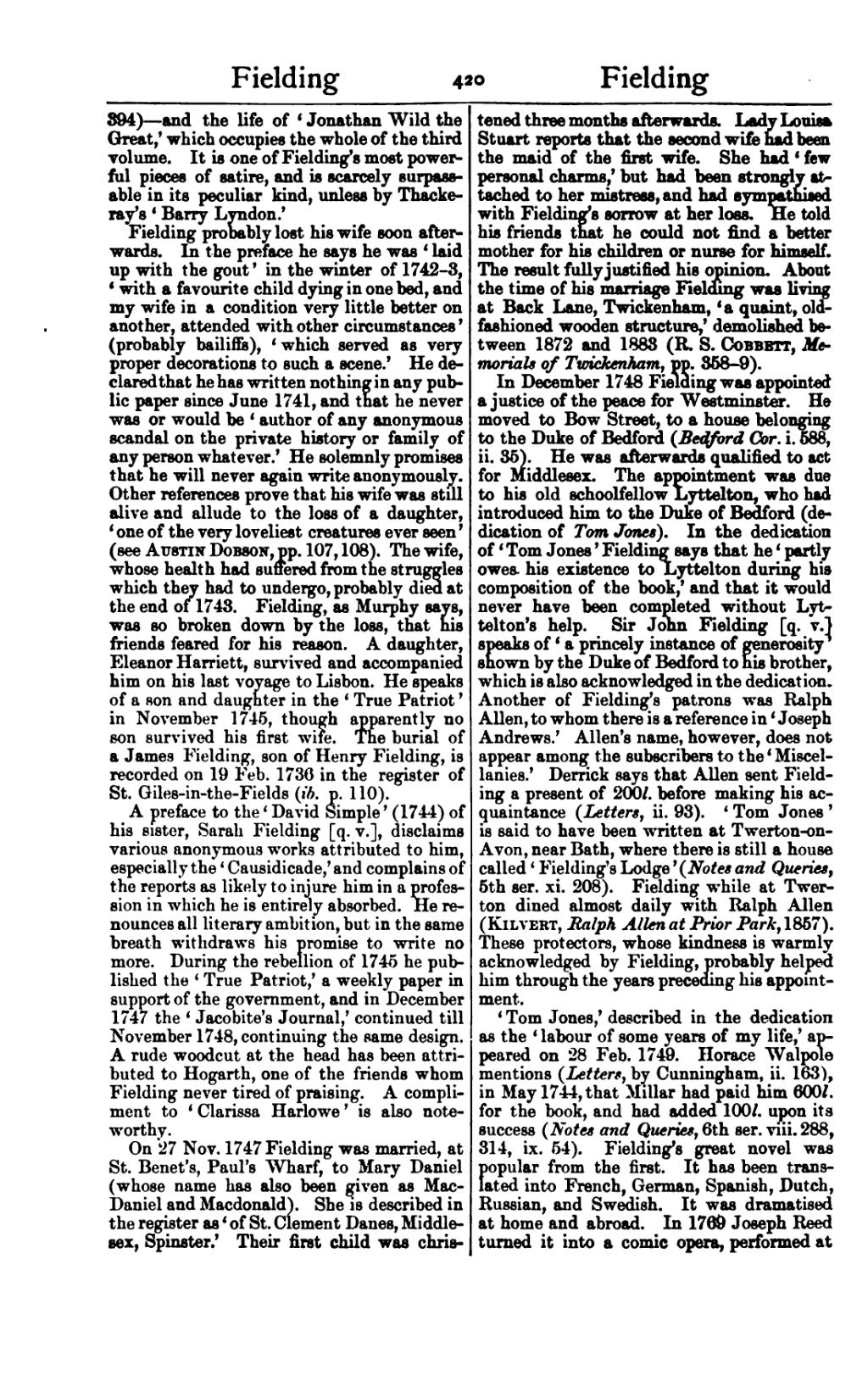394)—and the life of ‘Jonathan Wild the Great,’ which occupies the whole of the third volume. It is one of Fielding's most powerful pieces of satire, and is scarcely surpassable in its peculiar kind, unless by Thackeray's ‘Barry Lyndon.’
Fielding probably lost his wife soon afterwards. In the preface he says he was ‘laid up with the gout’ in the winter of 1742–3, ‘with a favourite child dying in one bed, and my wife in a condition very little better on another, attended with other circumstances’ (probably bailiffs), ‘which served as very proper decorations to such a scene.’ He declared that he has written nothing in any public paper since June 1741, and that he never was or would be ‘author of any anonymous scandal on the private history or family of any person whatever.’ He solemnly promises that he will never again write anonymously. Other references prove that his wife was still alive and allude to the loss of a daughter, ‘one of the very loveliest creatures ever seen’ (see Austin Dobson, pp. 107, 108). The wife, whose health had suffered from the struggles which they had to undergo, probably died at the end of 1743. Fielding, as Murphy says, was so broken down by the loss, that his friends feared for his reason. A daughter, Eleanor Harriett, survived and accompanied him on his last voyage to Lisbon. He speaks of a son and daughter in the ‘True Patriot’ in November 1745, though apparently no son survived his first wife. The burial of a James Fielding, son of Henry Fielding, is recorded on 19 Feb. 1736 in the register of St. Giles-in-the-Fields (ib. p. 110).
A preface to the ‘David Simple’ (1744) of his sister, Sarah Fielding [q. v.], disclaims various anonymous works attributed to him, especially the ‘Causidicade,’ and complains of the reports as likely to injure him in a profession in which he is entirely absorbed. He renounces all literary ambition, but in the same breath withdraws his promise to write no more. During the rebellion of 1745 he published the ‘True Patriot,’ a weekly paper in support of the government, and in December 1747 the ‘Jacobite's Journal,’ continued till November 1748, continuing the same design. A rude woodcut at the head has been attributed to Hogarth, one of the friends whom Fielding never tired of praising. A compliment to ‘Clarissa Harlowe’ is also noteworthy.
On 27 Nov. 1747 Fielding was married, at St. Benet's, Paul's Wharf, to Mary Daniel (whose name has also been given as MacDaniel and Macdonald). She is described in the register as ‘of St. Clement Danes, Middlesex, Spinster.’ Their first child was christened three months afterwards. Lady Louisa Stuart reports that the second wife had been the maid of the first wife. She had ‘few personal charms,’ but had been strongly attached to her mistress, and had sympathised with Fielding's sorrow at her loss. He told his friends that he could not find a better mother for his children or nurse for himself. The result fully justified his opinion. About the time of his marriage Fielding was living at Back Lane, Twickenham, ‘a quaint, old-fashioned wooden structure,’ demolished between 1872 and 1883 (R. S. Cobbett, Memorials of Twickenham, pp. 358–9).
In December 1748 Fielding was appointed a justice of the peace for Westminster. He moved to Bow Street, to a house belonging to the Duke of Bedford (Bedford Cor. i. 588, ii. 35). He was afterwards qualified to act for Middlesex. The appointment was due to his old schoolfellow Lyttelton, who had introduced him to the Duke of Bedford (dedication of Tom Jones). In the dedication of ‘Tom Jones’ Fielding says that he ‘partly owes his existence to Lyttelton during his composition of the book,’ and that it would never have been completed without Lyttelton's help. Sir John Fielding [q. v.] speaks of ‘a princely instance of generosity’ shown by the Duke of Bedford to his brother, which is also acknowledged in the dedication. Another of Fielding's patrons was Ralph Allen, to whom there is a reference in ‘Joseph Andrews.’ Allen's name, however, does not appear among the subscribers to the ‘Miscellanies.’ Derrick says that Allen sent Fielding a present of 200l. before making his acquaintance (Letters, ii. 93). ‘Tom Jones’ is said to have been written at Twerton-on-Avon, near Bath, where there is still a house called ‘Fielding's Lodge’ (Notes and Queries, 5th ser. xi. 208). Fielding while at Twerton dined almost daily with Ralph Allen (Kilvert, Ralph Allen at Prior Park, 1857). These protectors, whose kindness is warmly acknowledged by Fielding, probably helped him through the years preceding his appointment.
‘Tom Jones,’ described in the dedication as the ‘labour of some years of my life,’ appeared on 28 Feb. 1749. Horace Walpole mentions (Letters, by Cunningham, ii. 163), in May 1744, that Millar had paid him 600l. for the book, and had added 100l. upon its success (Notes and Queries, 6th ser. viii. 288, 314, ix. 54). Fielding's great novel was popular from the first. It has been translated into French, German, Spanish, Dutch, Russian, and Swedish. It was dramatised at home and abroad. In 1769 Joseph Reed turned it into a comic opera, performed at
